Growing and Spinning Florida Native Cotton
Today we’ll hear from guest blogger Caroline Tacker, who tells us about how she got started in the fiber world with a spur-of-the moment purchase of some inexpensive cotton plants!
I grow and spin Florida Native Cotton, which at its best has a ¾-inch staple. I currently use an Ashford Kiwi and Traditional for my spinning, but I can also use a Tahkli spindle. This cotton was grown in my front yard.
The Cotton that Almost Wasn’t
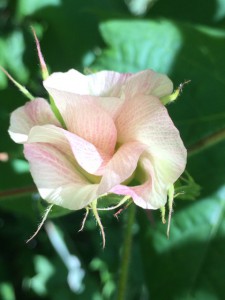
The bloom from a Florida Native cotton plant
Florida Native Cotton is part of the Hibiscus family, as are all cottons. It is an endangered plant in Florida. In the early 1940s a new bug was found on the cotton that resembled the boll weevil. Fearing another boll weevil-like attack, they decided to systematically destroy the plants. It just so happened that World War II broke out and those men left this project to join the armed forces. Hence some of this cotton survived… and NO new boll weevil was ever verified. There is an original strand of this cotton behind a synagogue at mile marker 31 on the way down to Key West. I can verify it’s there as I have seen it!
Florida Native Cotton grows much like our hibiscus: if left unattended it gets gangly and out of control. I do prune my plant back, to try and make it ascetically pleasing, and also to make it look like it belongs in the yard/garden. It is not cold tolerant; it prefers to grow below the subtropic line of Florida. I did lose all my plants to a freeze 5 years ago. Since then, a “volunteer” showed up.
The use of Florida Native Cotton in History
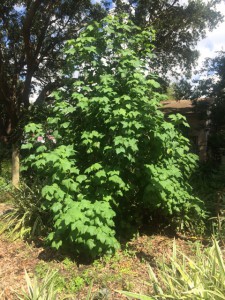
Caroline’s cotton plant
There is limited information about Florida Native Cotton; the one thing I haven’t seen about it is whether or not it was ever really used for anything. I’m sure people used it because that would be in our nature as pioneers: use what you have. As to what they used it for or on, I have not found any information. As to spinning it, my thoughts are it would be too labor intensive and not a good use of time for people who made everything from scratch, but I cannot find anything confirming they did or did not.
My Fiber Journey
My start down the fiber path started over 11 years ago in the spring when I attended a Florida native plant sale in St Petersburg, Florida (where I live). There I found Florida Native Cotton seedlings which they were selling at 3 pots for $1. I thought… if they live great, if they don’t I’m only out $1.
I was told that cotton liked full sun and carbon monoxide, so I planted my seedlings in the easement of my front yard, next to the road. As they grew over the next several months, they bloomed and then I had this white beautiful fuzzy cotton! Now that I had this lovely fiber… I had to figure out how to process it.
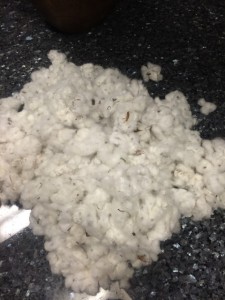
harvested Florida Native cotton
I did several web searches – how to clean, gin, etc. – and after a year of not finding much about how to process cotton, other than commercially. I’d kind of given up. Then someone suggested I go to Heritage Village (our local living museum). I contacted them and asked if they could teach me how to process my cotton and in exchange I would become a volunteer. In March of 2006, I met Wendy who taught me how to “gin” my cotton by hand and spin it on a tahkli spindle. I had the process down in about 45 minutes.
While volunteering at Heritage Village during their County Jubilee Festival, I met Judy of the Pinellas Weavers Guild. She was spinning on a lovely spinning wheel. We talked for awhile and she invited me to come to a guild meeting. I did and joined the Guild in December of 2006. Have loved being around other “fiber” minded people, I am currently still a member… and I am their curre
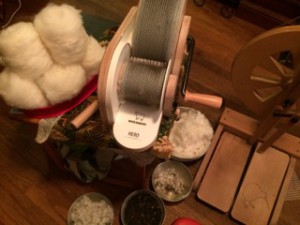
Caroline’s cotton ready to spin
nt president. I have also been the past Secretary and Vice-President.
So to sum it up… almost 12 years ago I purchased three Florida Native Cotton plants for $1. I have since learned to spin on a tahkli spindle, purchased 2 spinning wheels, a drum carder, a loom and other associated small equipment. I “play” with lots of different fibers, and I do sell some of the things I make, but I ALWAYS come back to cotton. I just love it.
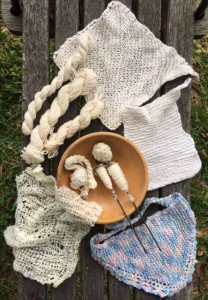
Samples of Caroline’s cotton spinning projects
Have you ever tried to grow or spin cotton straight from the plant? Tell us about your experiences & ask your questions in the comments!

Caroline Tacker is a Florida native born in Orlando, living in St. Petersburg for the past 25 years. She volunteers with Heritage Village as a living history docent (spinning cotton by hand) and is a member of the Pinellas Weavers Guild, Bay Area Knitting Guild, and Florida Tropical Weavers Guild. Find her on Facebook for more information.




Interesting, thanks for sharing! I have yet to try spinning cotton, but I really enjoyed this story.
Great post!! I am working on a blog post, and hope to have it up in the next couple of days, about my experience with cotton. I did grow some plants a few years back. I got gorgeous blooms, but— I had started to seedlings too late in the Spring and did not have enough growing season for the bolls to form. I’m in SW Ohio. So— while it is not unheard of to grow hobbyist cotton…. it is a bit of a challenge. Blessings~
I love your story, Caroline. So glad you shared it!
Thank you 🙂 Glad you enjoyed it. Sorry I don’t think I’ll be visiting Texas this year. I will miss stopping in & visiting with you.
How wonderful to hear about your journey, Caroline! This is absolutely fascinating. I’ve had a similar experience, except with the “gateway” homegrown (homenurtured?) fiber resource being a French Angora bunny rather than cotton plants. So many possibilities… I’ve only spun from cotton sliver, but your inspire me to try the bolls.
Am so glad I have inspired you to try cotton from the bols 🙂 I have yet to try angora, directly from the rabbit. Some day I will try that .
I met a friend who grew her cotton and spun it. I thought a person could not do that. I then listened to a podcaster talk about a talki spindle and how much then like it. Another friend had some cotton and let me borrow her Talki. I never knew long draw and got on U-tubes video and found Joan Ruane. I could see she was an excellent teacher and I purchased her DVD. All the light clicked on and I went to cotton clouds and purchased easy to spin pima cotton. I loved it so much that I ditched all my wool and have been spinning cotton ever since. My husband grew cotton for me this summer so I got to experience the ups and downs of growing cotton. The highlight of my year in 2015 was going to Brooks, CA and meeting Sally Fox. I have purchase many pounds of her cotton and I spin about 150 yards per week. Spinning cotton is so much faster than spinning wool; I love it is not hard on my hands. I use cotton as my therapy for stress and the chronic pain I have and it refocuses my mind. It is a good medicine and I have woven and knit many garments with my hand spun cotton.
Thank you for this blog. I hope to practice and learn to spin cotton better than I currently do. It is nice to know what wheels you use too. That way I am not afraid to try spinning cotton on my wheel.
Please don’t be afraid of cotton… it means you no harm 🙂 Just remember what type of fiber structure it is, and adjust your spinning accordingly.
Really nice post, Caroline! I was looking for an information like this. Thanks for sharing your experience with us!
Great info! Thanks for sharing!
Hi there,
I currently live in the Tampa area and found cotton growing on a canal about 5 years ago. It amazed me and i immediately picked as much as possible and planted the seeds. I now have 3 beautiful growing native cotton plants that I am absolutely obsessed with. Whenever I tell people i grow cotton they are amazed, and I haven’t seen any in the wild since. It’s good to know that others are keeping this plant alive.